Enterprise SEO strategically optimizes large-scale websites to boost visibility, acting as the fuel you need to drive organic traffic.
As an ad agency owner, I’ve collaborated with numerous enterprises, and I’ve seen firsthand the unique challenges and strategies this presents. Many business leaders often wonder about the differences between standard SEO and its enterprise counterpart.
In this guide, I’ll demystify Enterprise SEO, breaking down its challenges, key strategies, and the tools you need together with actionable insights.
Let’s get started.
What Is Enterprise Search Engine Optimization?
Enterprise SEO is designed to tackle the unique challenges that large organizations face. This powerhouse approach focuses on optimizing massive websites. I’m talking about websites with hundreds, thousands, or millions of pages, complex structures, and multiple stakeholders involved.
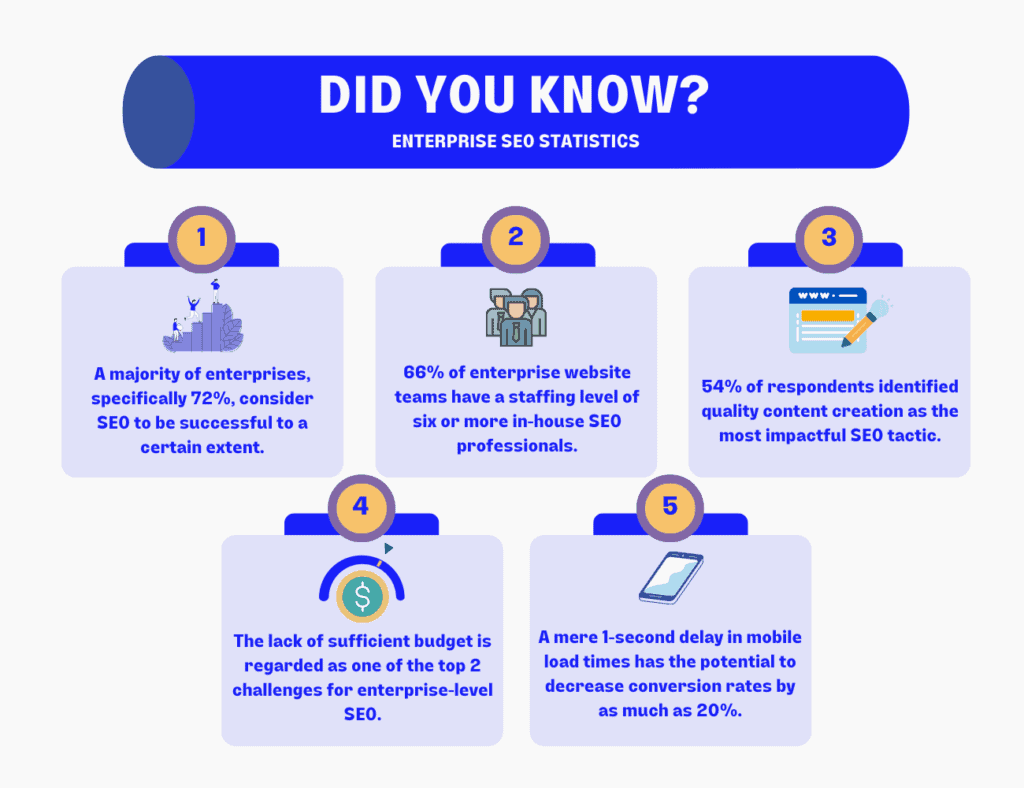
Multinational corporations generally have a website that’s a labyrinth of product pages, service offers, and valuable content. Traditional SEO techniques might get lost in the maze, but enterprise SEO unlocks its potential to get to the top of search engines.
Let’s dive deeper into what sets enterprise SEO apart from the other SEO types.
The Difference Between Enterprise SEO & Other Types Of SEO
In the SEO game, multiple players are involved to ensure that businesses of all sizes and purposes have the chance to top the search engine rankings.
Here’s an overview:
- Enterprise SEO: Involves managing large, complex websites with thousands or even millions of pages. It deals with multiple stakeholders and requires advanced SEO strategies and tools to handle the scale and complexity.
- Local SEO: Attracts more customers from relevant local searches. This involves optimizing the business’s Google My Business profile, getting positive customer reviews, and ensuring the business’s name, address, and phone number are consistent across the web.
- Mobile SEO: Optimizes websites for mobile devices. It requires your site to look good and function well on smaller screens, to load quickly, and is easy to navigate on a touchscreen.
- eCommerce SEO: Focuses on optimizing online stores, including optimizing product descriptions, category pages, and user reviews, as well as dealing with issues like shopping cart abandonment.
Think of SEO as a buzzing city. Enterprise SEO is the skyscraper, built for big companies with complex, large-scale SEO needs, while eCommerce SEO is the bustling marketplace, optimizing product listings to drive sales.
But they’re not the only occupants in the city. Mobile SEO is the city’s transit network, making sure your site isn’t just computer-friendly, but also fully accessible and efficient on mobile devices. Lastly, local SEO is the neighborhood coffee shop, lifting small businesses to stand out in local searches.
Why Enterprise SEO Strategies Are Crucial For Large-Scale Business Growth
An enterprise SEO strategy encompasses all aspects of your digital presence, aligning them with your overarching business goals. When you’re playing in the big leagues, you need a broader approach, and traditional SEO won’t cut it.
However, with a well-crafted enterprise SEO strategy, you’ll harness the power of project management and propel your marketing efforts to new heights.
It ensures that every single page is finely tuned for optimization, including each of your product or service categories. Plus, it fosters a smooth collaboration across various departments, so you can implement enterprise SEO efforts seamlessly.
The Power Of SEO: Small Business Growth vs. Corporate Expansion
Other than the sheer complexity, understanding the nuances between small business and large corporation SEO empowers you to craft tailored strategies that perfectly align with your unique business requirements.
For instance, a small local mechanical shop will focus on building a strong presence in local search results, while a multinational corporation like Amazon would employ a comprehensive enterprise SEO strategy to manage its vast array of product pages.
Let’s break down the key differences between how SEO is done for small businesses vs. enterprise-level companies so you’ll know why you need the latter.
| Small Businesses | Large Organizations |
| Wear multiple hats, handling various SEO tasks like search term research, content creation, and link building. | Requires dedicated teams, equipped with enterprise platforms & tools to manage vast amounts of data and analytics. |
| Benefits from long-tail search terms that mimic natural online searches, catering to their localized customer base. | Requires meticulous keywording efforts. Each page and article requires specific search terms that are relevant and competitive. |
| Small businesses will find SEO implementation simpler, especially when targeting a local audience. | Enterprise SEO teams face a longer research process because of multiple target personas. |
The nuances and complexities of enterprise SEO will take up much of your valuable time and energy, resources you can use for core business decision-making matters. You can either build an in-house team of SEO experts or outsource the project so you can take advantage of diverse skills, expertise, and experience.
With that, let’s dive deeper into the challenges your enterprise company may face while dealing with enterprise SEO so you won’t be blindsided.
4 Challenges To Understand While Deploying Your Enterprise SEO Efforts
Deploying enterprise SEO efforts on large-scale enterprise sites can present business leaders with unique challenges. Knowing these hurdles prepares you to deal with them and ensure a successful implementation. Let’s get started.
1. Balance Global & Local SEO Strategies
Global SEO captures a broad audience, focusing on universal search terms and overarching trends. On the contrary, local SEO hones in on location-specific search terms, tailoring content to resonate with the preferences and search behaviors of local customers.
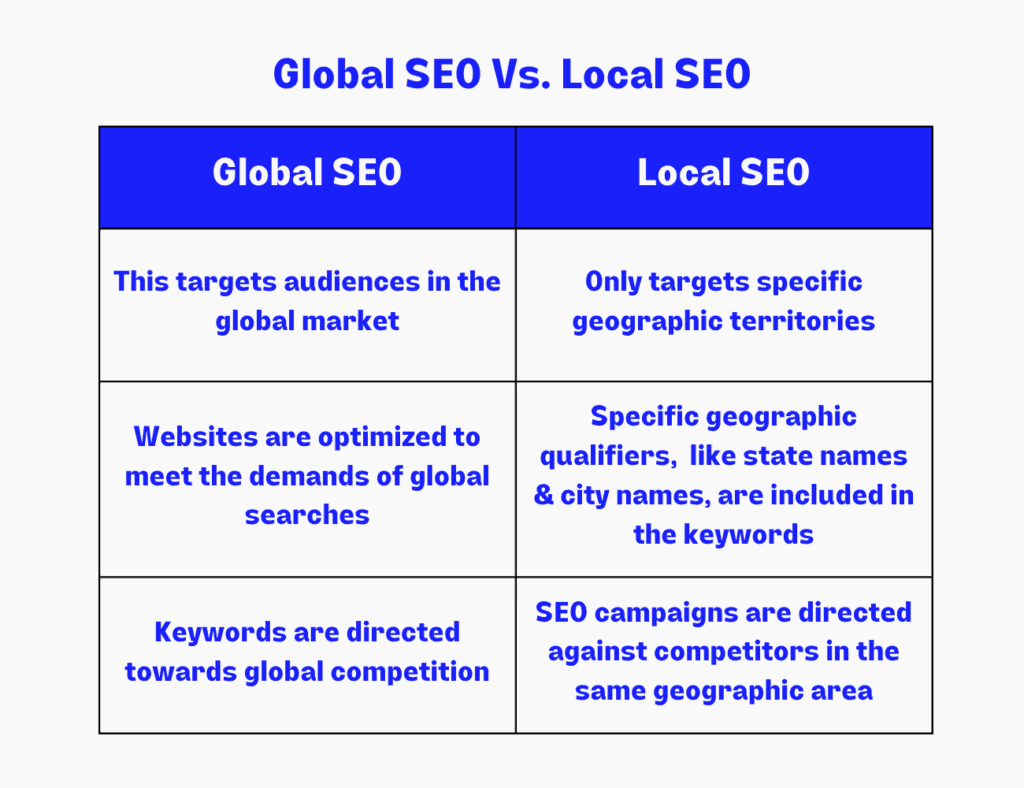
The primary hurdle lies in addressing the specific needs of each location while maintaining a cohesive brand identity. Thus, SEO teams should navigate a complex landscape where multiple websites, web pages, content marketing, and web development need to be optimized for both global and local contexts.
Solution:
To address this challenge, your SEO team should adopt a two-pronged solution:
First, develop a comprehensive SEO strategy that integrates both global and local elements. This includes conducting thorough research on each location’s market, identifying relevant search terms, and tailoring content to suit local preferences.
Second, implement enterprise SEO practices utilizing analytics tools, like Google PageSpeed Insights or Ahrefs, and establish streamlined processes. This helps manage multiple websites efficiently and ensures consistency in branding and messaging.
For example, a global fashion retailer might employ global SEO strategies to target broad search terms like “trendy clothing,” while simultaneously implementing local SEO tactics to capture specific local markets with search terms like “stylish dresses in [City].” This approach allows them to strike a balance between broader global visibility and localized relevance.
2. Immense Scale & Complexity
Think of diving into a vast ocean of web pages, where each page represents an opportunity to attract visitors and drive organic traffic. That’s where the challenge arises. With thousands or even millions of pages to optimize, traditional SEO companies struggle to keep up.
It’s hard to make sure that every page is optimized and aligned with the overall SEO goals of your enterprise company. Additionally, maintaining consistency across hundreds or millions of pages adds another layer of complexity. Make sure that branding, messaging, and optimization practices stay aligned throughout the website.
Moreover, the dynamic nature of the digital landscape further intensifies the challenge. Search engine algorithms are constantly evolving, so it requires you to continuously monitor and adapt your enterprise SEO strategies.
Stay on your toes to keep up with the latest trends and best practices. Plus, you’ll need to address the unique challenges resulting from the scale and complexity of enterprise websites.
Solution:
This requires meticulous attention to detail, strategic planning, and efficient execution. So, leverage an enterprise SEO agency with extensive experience handling massive page volume. They should have a proven track record and experience in handling such complexities.
Make sure they have a proven system to streamline managing and optimizing large-scale websites. This lets identifying the most important pages (high-traffic pages attracting sign-ups and new customers, key product or service pages, or those with the most conversion potential) more seamless.
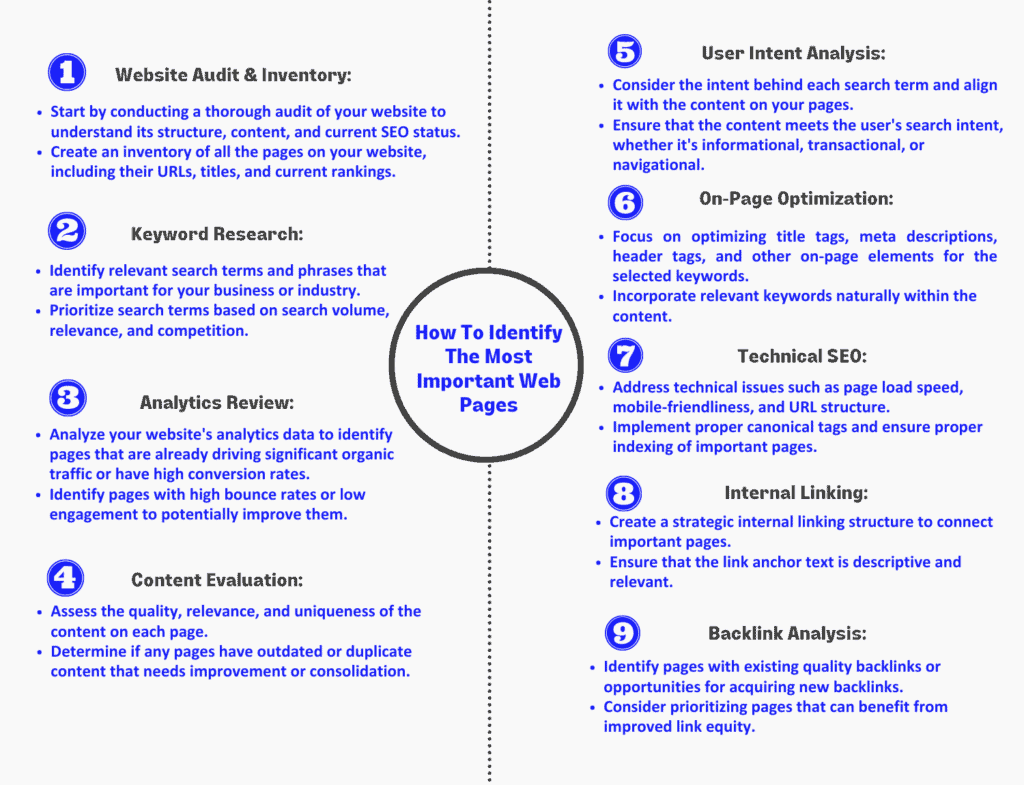
Once identified, you can focus your SEO efforts on these pages, optimizing them to maximize visibility and engagement.
In addition, conquering the scale and complexity of enterprise SEO requires your team to practice effective project management. Breaking down the optimization process into manageable tasks, setting priorities, and establishing clear timelines will help them stay organized and focused.
Therefore, they can efficiently navigate the intricacies of web development, content optimization, and ongoing SEO maintenance no matter the scale of your website or the complexity of your site structure.
3. Stuck With A Legacy System
Most enterprise companies still use a legacy system and dealing with it is like navigating through a dense jungle with an outdated map and limited resources. It’ll leave you with a lack of proper documentation and understanding of the system, making it difficult to navigate and troubleshoot.
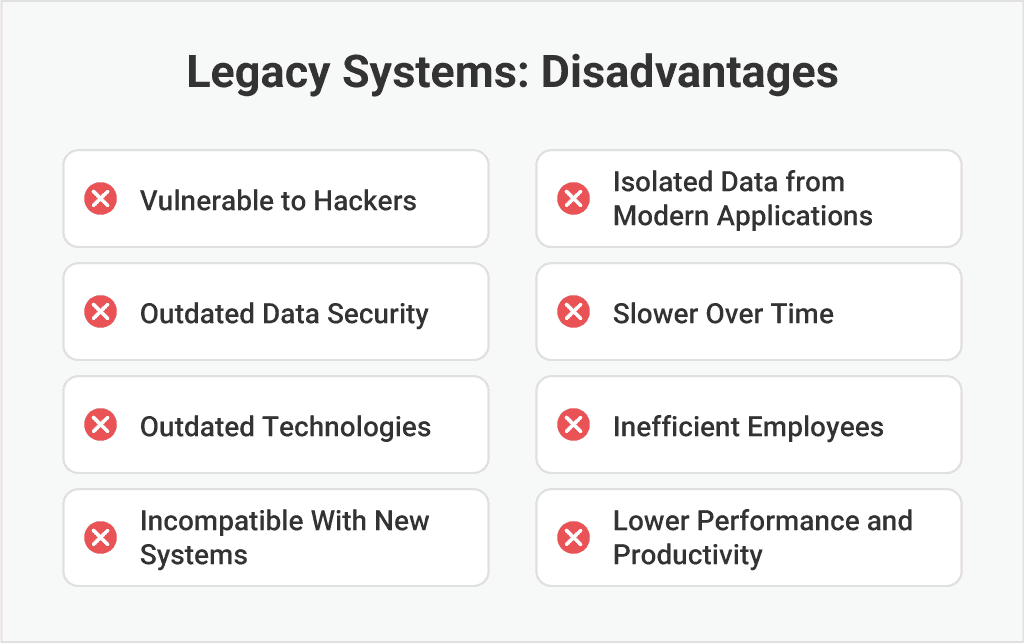
Enterprise businesses with legacy systems that aren’t designed to comply with SEO guidelines will create roadblocks in ranking at the SERP. These systems are older and less efficient, making them slow to run your commands.
This sluggishness can significantly impact your SEO efforts because it affects page load time, a key factor in Google’s ranking algorithm. Plus, slow websites frustrate users and discourage search engines from indexing content promptly.
Legacy systems also make your website vulnerable to security threats, affecting your trustworthiness in your users and Google’s eyes. These factors will lower rankings and cause bad user experience, ultimately, diminishing organic traffic.
Solution:
Overcoming these constraints requires close collaboration between SEO experts and IT teams to identify and implement solutions. But one way to fix this is to invest in an enterprise SEO solution and leverage SEO tools to streamline the process of identifying and addressing technical SEO issues.
But before knowing which tools are most appropriate for your website, do a comprehensive technical SEO audit. This assessment will uncover areas for improvement, including optimizing page load times, restructuring site navigation, or implementing mobile-friendly designs.
It’ll also likely involve optimizing code and scripts, implementing caching mechanisms, or restructuring the site architecture to enhance crawlability. Track results to know whether the changes made in the systems are meeting the SEO needs of your enterprise site.
4. Lack Of Organizational Alignment
Visualize this as a complex puzzle, with multiple pieces that should intricately fit together for a seamless outcome. Implementing enterprise SEO strategies is already daunting, but it gets more complex because you need to keep all company departments on the same page.
Enterprise SEO agencies have to bring together diverse teams, each with their own objectives and perspectives, to work towards a common goal. Every department at a massive corporation will have competing priorities or a limited understanding of SEO’s impact on overall business success.
For instance, marketing teams might focus on traditional advertising methods, while web development teams prioritize technical functionality rather than user experience. Breaking down these silos and fostering cross-departmental collaboration will be a significant hurdle. Plus, company departments won’t get out of their way to prioritize what the SEO teams want.
Solution:
Education and communication will play a crucial role in overcoming this challenge. Your SEO team should educate stakeholders about the importance of SEO and its direct impact on driving organic traffic, improving visibility, and ultimately generating revenue.
But it’s not that easy. They should present success stories and demonstrate the tangible benefits of enterprise SEO. Doing so will get the support of your various teams since they’ll see real-world numbers.
Additionally, establishing an enterprise SEO team that acts as a central hub for communication and collaboration can facilitate the alignment process. This team can bridge the gap between departments, provide guidance on SEO best practices, label responsibilities for each task, and ensure that everyone is working towards a shared vision.
In essence, aligning SEO goals with the broader business objectives allows your organization to work together harmoniously to achieve the desired results.
Following our discussions of the challenges you may face while implementing enterprise SEO practices, it’s time to delve into the SEO strategies that’ll need your attention first.
6 Proven Enterprise SEO Strategies That Work
To overcome the challenges, adopt a comprehensive and well-executed strategy. Here are key strategies that contribute to the success of enterprise SEO initiatives:
A. Leverage Website Structure With Clear Hierarchy
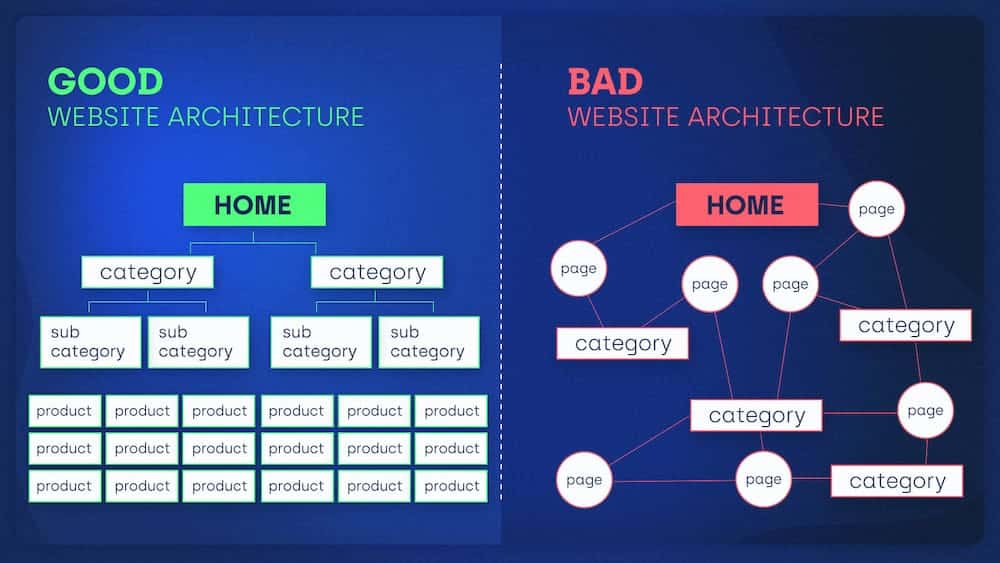
Implementing this strategy requires a thorough and all-encompassing approach considering the scale of enterprise sites. However, SEO agencies specializing in serving enterprises will undoubtedly have tools, like Screaming Frog and DeepCrawl to execute this strategy effectively.
But how does this strategy benefit your SEO efforts?
SEO professionals will conduct site audits, identify areas of improvement, and restructure the site to ensure a logical hierarchy and easy navigation for search engines and users. Once your site architecture is well-organized, search engines can crawl and index your pages more efficiently.
How does that happen?
With a logical structure, bots can easily navigate from page to page, comprehending the relationships between different sections and content. This facilitates faster and more accurate indexing, making sure that your hundreds to thousands of web pages are included in search results promptly.
One way to maximize this strategy is to employ the internal linking technique. Doing so will help distribute link equity across your website. When your SEO team interlinks relevant pages with specific anchor text, they’ll pass on the authority and ranking potential from high-ranking pages to others.
For example, consider a large eCommerce enterprise with multiple product categories. Structuring the site architecture in a way that categorizes products into relevant sections, like electronics, clothing, and accessories, lets users and search engines quickly find and access the desired products.
Additionally, internal links can then be strategically placed, connecting related products and guiding users to explore additional offerings within the same category. This improves the overall search engine visibility of your important pages and enhances the user experience by providing contextual links to related content.
B. Prioritize Website Speed

In today’s fast-paced digital world, users expect websites to load quickly and provide a seamless browsing experience. It’s simple. No one has the patience to wait anymore, especially when other websites are available in your niche.
Focusing on optimizing your enterprise site’s speed improves user satisfaction, reduces bounce rates, and increases engagement. Ultimately, improving search engine rankings and even having higher conversion rates.
Sounds easy, right? Not really. Adopting this strategy within a large organization requires an extensive approach because of the volume of web pages to handle.
Typically, your SEO team starts with conducting a technical SEO analysis of your website to identify areas where you can enhance page speed using tools like Google Page Speed Insights, Pingdom, and DefiniteSEO’s SEO Checker.
They’ll make evaluating your site’s loading times and identifying potential areas for improvement more seamless. However, this can take a lot of time and resources because of the vast amount of pages to test.
From there, they’ll need to implement strategies like image compression, minimizing redirects, and caching your web pages to enhance page speed across your enterprise site.
This reduces bounce rates, telling search engines that your content is valuable and relevant.
C. Harness User-Generated Content
When you actively encourage your customers to leave reviews, comments, and testimonials, you also build trust and credibility with potential customers.
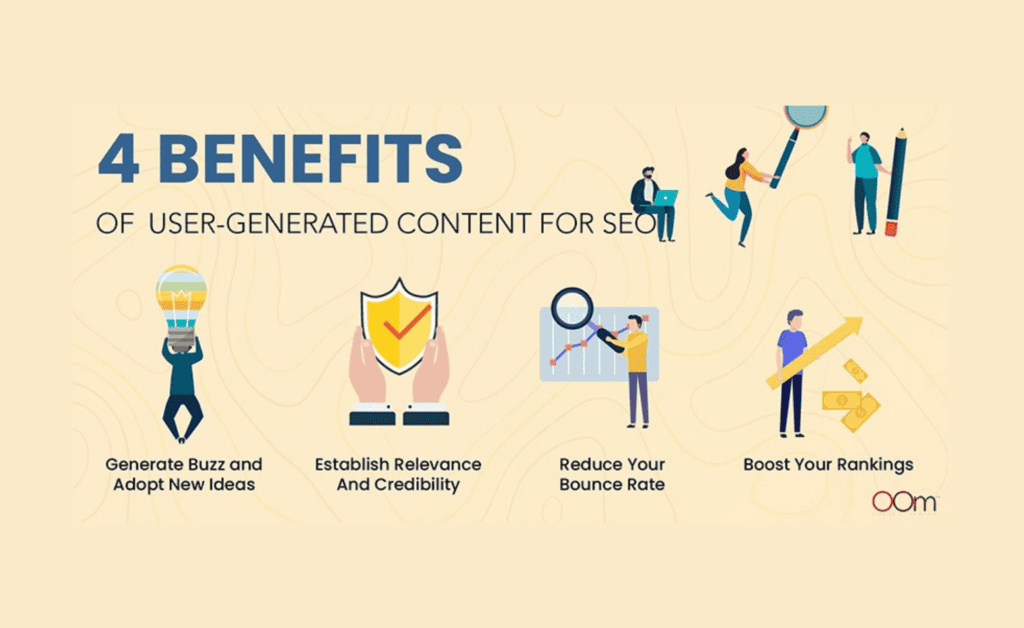
UGC also provides a steady stream of fresh, relevant content, telling search engines that your website is active, authoritative, and deserving of higher rankings.
What’s more, UGC often includes long-tail search terms and user-generated phrases to enhance your website’s visibility for specific search queries. It also strengthens your social proof, helping to build trust with your audience.
When potential customers see positive reviews, comments, and testimonials from other satisfied customers, it instills confidence in your brand and products. This improves website engagement, increases conversions, and boosts customer loyalty.
So, how does your SEO team do this for your enterprise-level site?
Establish a system to encourage and manage UGC is a start. This involves implementing review platforms, comment sections, and testimonial submission forms. You can leverage what your clients say and turn them into case studies to highlight what your products or services can do for other prospects.
Additionally, active engagement with customers, responding to their feedback, and addressing concerns fosters a positive relationship and encourages further UGC.
D. Maximize Local SEO Efforts
So, what’s the big enterprise SEO benefit here?
Make your website a magnet for organic search traffic by optimizing individual location pages with search terms relevant to the geographic area you’re targeting throughout your localized content.

However, before all that, you should first do search term research to uncover the local golden phrases your customers are typing into search engines. Next, make sure each location page showcases accurate business info and localized content. Be the go-to expert for your specific areas.
Also, there’s one specific task your SEO team won’t likely miss. That is to utilize the power of local business directories, like Google My Business.
E. Create Quality Content At Scale
We all know that when it comes to SEO, top-notch content is king. That’s why another SEO strategy that’ll take your enterprise company’s online presence to the next level is quality content creation at scale.
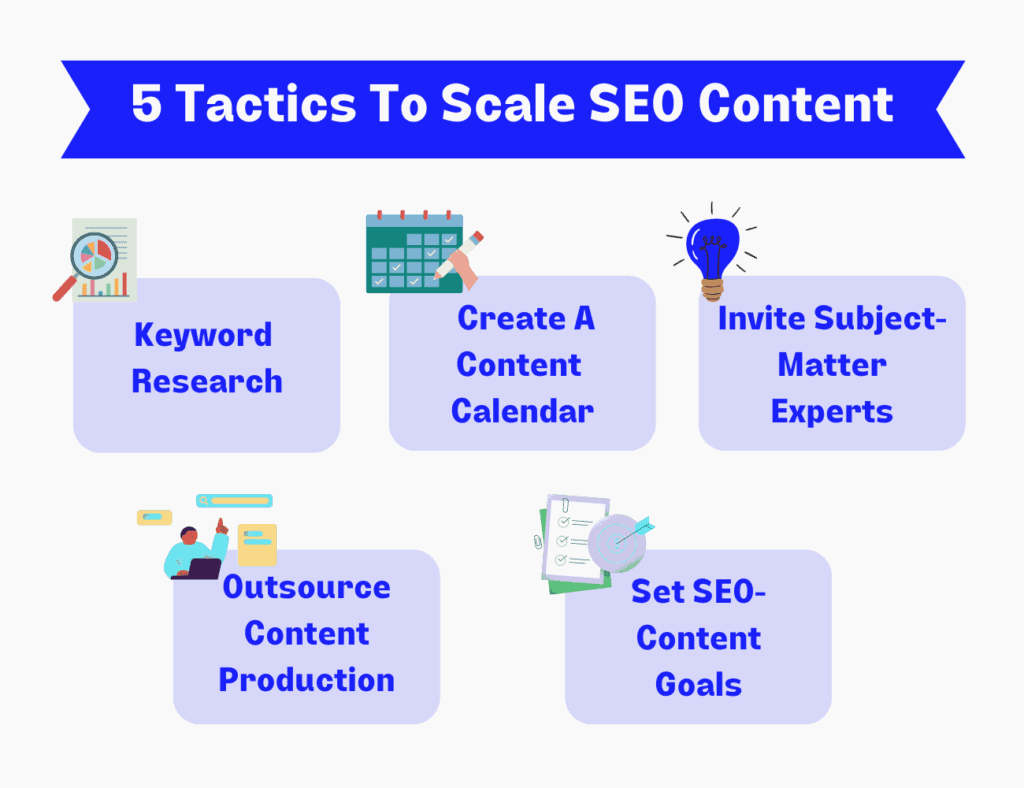
Quality content creation enhances your website’s credibility, boosts organic traffic, and attracts potential customers. It also provides an opportunity to strategically incorporate internal links, further strengthening your site’s SEO prowess.
However, unlike small brand websites that only need a small team to handle everything, enterprise sites are the opposite.
To make this work, you’ll need separate teams solely dedicated to creating content and conducting search term deconstruction at scale using the hub and spoke method. This process all starts with a conversation between you and those teams.
Discuss the direction you want to go, including how many articles you need them to produce monthly. Once that’s decided, proactively collaborate with the writer and editor to develop a publishing schedule that works for everyone involved.
Then, your SEO team will have to continuously identify new hub and spoke search terms to rank for and hand them off to the content creation team.
Other than that, your content creation manager should also provide writers with detailed guidelines on how to make each post stand out from the competition.
These guidelines could include meeting search intent, using relevant search terms, leveraging value-packed media, and ensuring that the writer uses the people-first approach instead of only appeasing search engines.
Having specialized teams in place lets your enterprise company efficiently produce high-quality content that caters to the needs and desires of your target audience.
F. Emphasize Mobile Optimization
50.9% of buyers shop on their phones at least once a week. That’s more than half of online shoppers globally. That’s why optimizing your enterprise site for mobile use is crucial in today’s business climate.
Everyone is on their phones, whether for work or leisure. So, if your enterprise site isn’t mobile-friendly, you’re missing out on a massive chunk of potential customers.
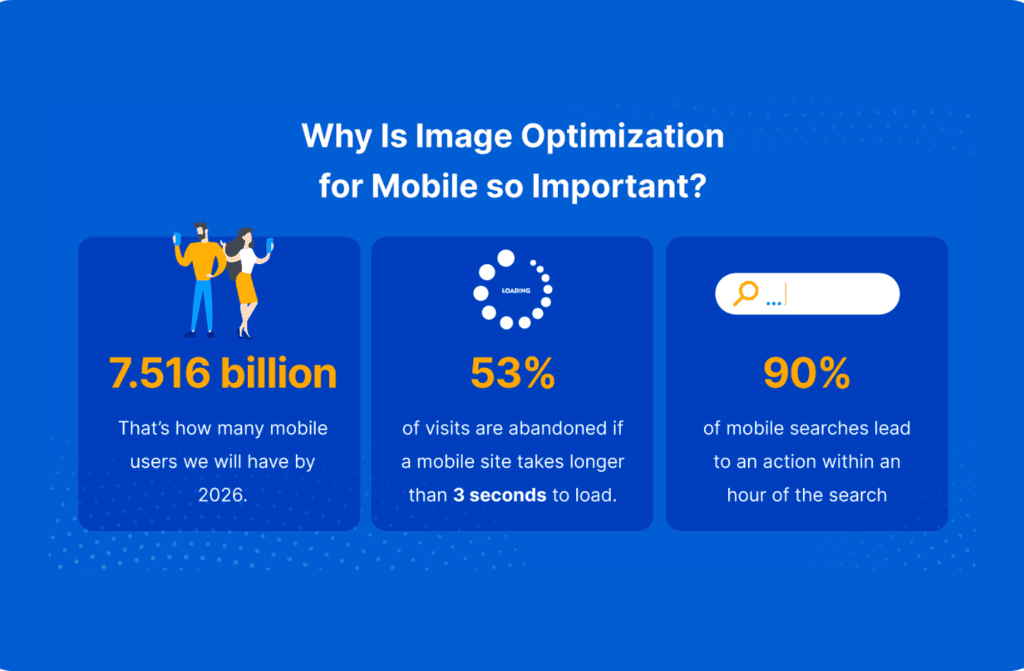
So, how does your team ace this strategy?
It’s all about creating a seamless user experience across different screen sizes. Therefore, your SEO team needs to put its focus on responsive design and intuitive mobile navigation. So, when users land on your web page using their smartphones or tablets, they will have a smooth and enjoyable experience.
To give you another reason why this strategy is a must, Google made the mobile-friendliness of websites a ranking factor. With this strategy, you’re strengthening your organic search power. When your enterprise site is mobile-optimized, search engines recognize it and pat you on the back with higher rankings.
In addition, mobile optimization helps you cater to the needs of your on-the-go audience, making it easier for them to engage with your site and brand. This means more visibility, traffic, and ultimately, more business for you.
However, due to the scale, complexity, and amount of media to be optimized, applying mobile-friendliness for your enterprise site will require long-term investment and a helping hand from agencies or enterprise SEO solutions to handle all the technicalities involved.
Following our discussion of the best enterprise SEO strategies, let’s get into the tools you should know about. The strategies we just talked about are only as good as the tools you use.
4 Best Enterprise SEO Tools To Use In 2023
SEO tools make implementing your SEO strategies more effective and efficient. They’ll also turn time-consuming and demanding tasks into more manageable pieces.
I. Enterprise SEO Platforms
With the help of powerful enterprise SEO platforms, like BrightEdge and Conductor, the SEO optimization process for your brand’s massive website becomes smoother. These platforms are the secret to managing and analyzing your SEO performance at scale, as well as driving tangible results for your business.
They have a comprehensive set of features that allows you or your SEO teams to access a one-stop solution for all your SEO needs. With them, you can leverage proprietary solutions like:
- HyperLocal: Provides insights into local search performance across multiple locations and against local competitors.
- Insight Stream: Delivers personalized recommendations and insights, helping enterprise teams prioritize their SEO tasks.
- Conductor 360: Provides a holistic view of the enterprise’s digital presence, integrating data from multiple sources like web analytics, social media, and backlink analysis.
- Opportunity Forecasting: Predicts the potential impact of their SEO initiatives by providing insights into potential traffic, revenue, and conversions.
These platforms also give you dedicated teams to ensure you’ll get the focus you deserve. They offer valuable insights and analytics that allow you to understand your website’s health and identify areas for improvement. With this knowledge, you can fine-tune your strategies and stay ahead of the competition.
II. Search Term Research Tools
These are indispensable resources for enterprise SEO teams. Leveraging the data and insights from these tools guide them in optimizing content and targeting the ideal search terms. Hence, increasing the chances of building maximum impact and improving organic search visibility.

But how do they do that?
Tools like SEMrush, Ahrefs, and Moz Keyword Explorer, gather data from multiple sources, including search engines and user behavior patterns. Then, they compile this data into a comprehensive database.
All you have to do is input a seed search term or topic into the tool, and it generates a list of related search terms based on the data it collected. These suggestions can include long-tail search terms, synonyms, and variations.
Here’s what else they can offer:
- Search Term Metrics: Ahrefs has metrics like search term difficulty, indicating how challenging it is to rank for a particular search term. They also provide data on trends and seasonal variations.
- Competition Analysis: Assess factors like the number of websites targeting the search term, the strength of their backlink profiles, and their domain authority.
- Search Volume Estimation: Estimate the average monthly search volume for each search term. This helps you understand the potential traffic and popularity of specific search terms.
These tools help you track search term rankings over time. Thus, providing insights into ranking changes. Plus, they offer reporting features to monitor progress.
III. Technical SEO Tools
Technical SEO tools are crucial for enterprise-level SEO services because it enables professionals to audit and optimize sitemaps, 404 errors, and structured data, of enterprise websites efficiently. Here are 3 popular platforms that offer these capabilities:
- Sitebulb
- DeepCrawl
- Screaming Frog
These platforms and their ability to run technical SEO play a vital role in this process by crawling websites and identifying issues that will hinder your site’s performance. They systematically navigate through the site, examine every page, and gather valuable data.
This data includes information about page load speed and HTML structure, among other technical elements. They also help you to:
- Resolve broken links to ensure smooth navigation.
- Eliminate duplicate content to enhance search engine visibility.
- Sort crawl errors to confirm that search engines can index the website properly.
In addition, utilizing these tools guarantee that your site meets search engine guidelines and provides an optimal user experience. This improves search engine rankings, increases organic traffic, and boosts conversion rates.
IV. Content Management Systems (CMS)
Content management systems (CMS) equipped with built-in SEO features are invaluable tools for enterprise SEO teams and marketing agencies working with enterprise-level sites. These prominent CMS platforms include WordPress, Drupal, and Magento.
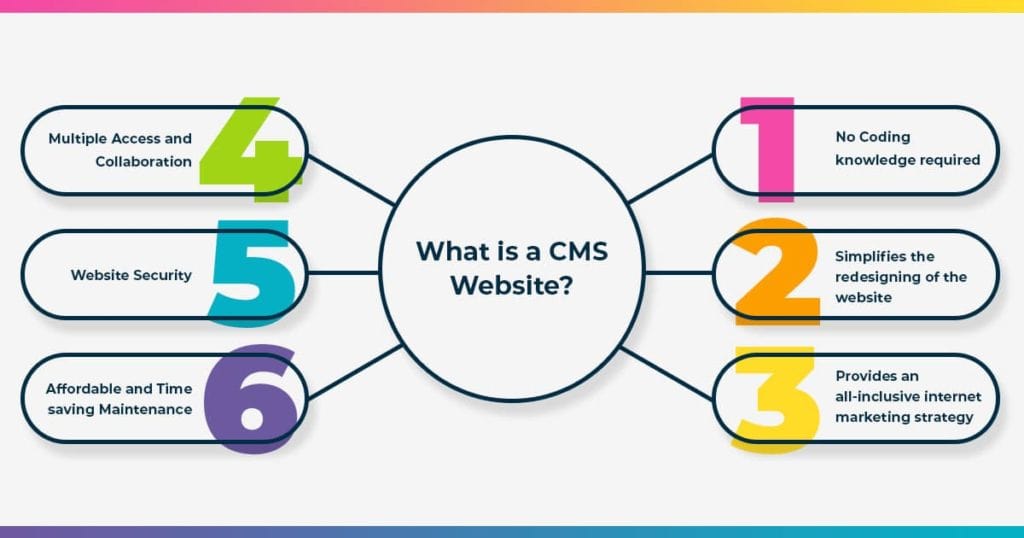
They offer a variety of plugins and extensions specifically designed to streamline content optimization and management. Utilizing these CMS platforms helps your enterprise SEO professionals effortlessly implement on-page optimization strategies.
This includes optimizing the following:
- Headings
- Meta tags
- Image alt text
It ensures that each element aligns with the targeted search terms and provides valuable information to search engines. Additionally, they allow for URL structure customization so SEO experts can create user-friendly and search engine-friendly URLs.
But that’s not all. Content creation is also made more efficient with CMS platforms. They provide intuitive interfaces and user-friendly editors, simplifying the process of producing high-quality and SEO-friendly content.
Knowing the tools is one thing, but those wouldn’t give you the results you want if you’re heading down an outdated path. You need to know about the trends making waves in SEO, so you won’t be left behind by your competitors.
Enterprise SEO Trends To Watch Closely In 2023
Knowing enterprise SEO trends ensures your strategies are effective and helps you adapt to changing algorithms. Thus, keeping you ahead of the curve. When you stay informed, you stay competitive.
a. Artificial Intelligence (AI)
Nowadays, AI seems to be everywhere, and it has seeped into enterprise SEO. It can automate tasks, which is much needed when managing hundreds to thousands of web pages.
An example is Ahrefs’ AI-powered title generator. When you do large-scale content creation, having access to this useful tool can make the process more efficient.
Additionally, there’s the super popular ChatGPT4. You can leverage it for content ideation, making it easier for your enterprise site to manage producing a vast amount of content for hundreds of web pages.
But remember that these AI tools are not perfect. It’s only as good as the information it has on the database. Also, while it can rewrite ideas for different users, the main thought stays the same making it hard for you to present a fresh angle when fully relying on this AI tool. So, always add your human touch. Use ChatGPT4 for ideation but have human writers create the content.
b. Mobile-First Indexing
Google predominantly uses the mobile version for indexing and ranking, so a subpar mobile experience can negatively affect your visibility in search results.
However, it’s more than just shrinking your website to fit a smaller screen. It’s about speed, user experience, and mobile-friendly design.
c. Voice Search Optimization
Voice search is on the rise and it’s changing the enterprise SEO landscape. That’s why you should optimize your website with natural language and long-tail search terms.
In voice search, users don’t just say a search term, they ask the whole question. For instance, instead of saying pizza place, they’ll say “Hey Google, find me a pizza place nearby.”
d. Core Web Vitals
These are a set of specific factors that Google considers important in a webpage’s overall user experience. Here are the vitals part of Google’s page experience score:
- First Input Delay (FID): This gauges interactivity and looks at how long it takes for a page to become interactive, meaning how quickly it responds to user actions like clicks.
- Cumulative Layout Shift (CLS): Ever read something online and the content suddenly shifts causing you to lose your place? That’s what CLS measures, visual stability.
- Largest Contentful Paint (LCP): It measures how quickly the main content of a webpage loads. It should be within 2.5 seconds or less.
If those factors aren’t optimized, your ranking will take a hit.
e. Video SEO
Video optimization is reshaping enterprise SEO, adding a dynamic, engaging, and shareable element to content strategies. It’s not just about creating compelling videos, but also ensuring they’re discoverable in search engines.
This involves using relevant search terms in titles and descriptions, adding accurate captions, and creating compelling thumbnails. Videos also offer additional opportunities for backlinks and can increase dwell time on your site, both positive signals to search engines.
3 Enterprise SEO Examples To Consider
i. Walmart
This US retail giant is steering a website with around 27 million indexed web pages on Google. With so many pages to handle, update, and maintain, it’s impressive that it ranks between 1 and 3 for 1.2 million search terms.
How does Walmart continue to stand tall? It employs SEO taxonomy.
That means Walmart structures its website with a clear hierarchy, ensuring that each product is categorized logically. This not only helps users navigate the site but also allows search engines to understand the site’s structure, improving indexation.
Additionally, it invests in building its backlink profile, resulting in hundreds of millions of websites linking back to Walmart pages.
ii. IBM
As a global leader in the IT industry, IBM’s website contains around 9 million indexed web pages on Google, covering a wide range of topics, from product information to research papers. Despite having to manage such a huge website that has content answering different search intents, IBM managed to rank on the 1st page for 100,000 of their target search terms.
To achieve that, IBM partnered up with BrightEdge. One of the tasks they focused on was creating an updated SEO framework to break down the priorities, making sure that optimization goals are well-defined. They also developed a clear website hierarchy to manage thousands of URLs.
iii. Sprout Social
Sprout Social is a social media management platform that handles some of the biggest companies worldwide, including Zendesk and Subaru. Their indexed web pages are not in the millions like the other 2 examples but they’re still managing around 6,500 pages and ranking for around 151,600 search terms.
One of the SEO strategies that Sprout Social focused early on is flipping blog content. They used their historical data to determine which of their blog posts needed to be re-optimized to turn things around and give them a much-need traffic boost. But of course, this strategy is coupled with many others that allow them to continue their success in their niche.
Your Next Move
Mastering the unique dynamics and complexities of enterprise-level sites, implementing effective enterprise SEO strategies, and employing the right tools is what big organizations need to thrive in today’s digital landscape.
However, SEO and the guidelines that come with it are always evolving. Continuously assess and refine your approach to stay ahead of the curve.
Always ask relevant questions: Are you effectively targeting the right search terms? Are you optimizing your content for maximum impact? This will help you be proactive.
After all, you won’t stay on the first page of search engines if your website doesn’t keep up with the new rules. You need to embrace the continuous process.
So, are you ready to take your enterprise SEO to the next level?
Novum can provide the expertise and support you need to elevate your digital presence.
With our ROI-driven approach to SEO, quick turnaround time, and AI utilization, we’ve helped companies make their mark on search engines. Schedule a consultation now and be the next company to achieve a 593% growth in leads with our help.
FAQs
A. How soon can I see the results?
Simple answer: It depends.
With its scale and complexity, the results will take several months or a year to materialize. However, minor progress can be felt within weeks too. Overall, the timeline can vary based on factors like the website’s current state, competition in your industry, resources allocated, and the specific SEO strategies implemented.
B. What is a Google Penalty?
It’s a punitive action Google takes against a website that violates its guidelines. Google uses complex algorithms to crawl and analyze websites to identify violations. They also employ manual reviewers who can issue penalties for more nuanced violations.
The penalties can be triggered by black-hat SEO techniques, having poor-quality content, or engaging in spammy link-building practices among others. Once a website is penalized, it can cause a drop in search rankings, a decrease in web traffic, or in severe cases, removal from search results entirely.
C. How can you leverage ChatGPT for Enterprise SEO?
Here are helpful ways ChatGPT can help enterprise SEO implementation:
- Produce content ideas
- Create meta descriptions
- Suggest relevant search terms
- Give SEO-friendly content titles
- Generate engaging, SEO-friendly content
All of which can make the process of managing hundreds, thousands, and millions of websites less time-consuming.
D. What are black hat enterprise SEO practices to avoid?
There aren’t any black hat techniques exclusive to enterprise SEO. However, a few agencies or SEO “experts” are more tempted to use these techniques because of the sheer scale of enterprise site projects.
Some will automate content generation, where content is created with little human oversight, but the quality isn’t always the best. Others also do scraping, where content is copied from other sites to quickly populate many pages. These practices will cause penalties from search engines and should be avoided in favor of ethical, white-hat SEO strategies.
E. How do you know if your business needs enterprise SEO?
It’s time to call for help when your team is struggling to maintain consistent SEO practices across your site. Another indicator is if managing your SEO becomes too complex or time-consuming that it pulls you away from other important functions of your business.
Additionally, you need enterprise SEO if you hit hundreds to millions of web pages and are operating in multiple regions or languages. If competition is mounting in your niche, it’s time to partner up with an SEO agency that has the manpower and resources to help you navigate the digital world.

